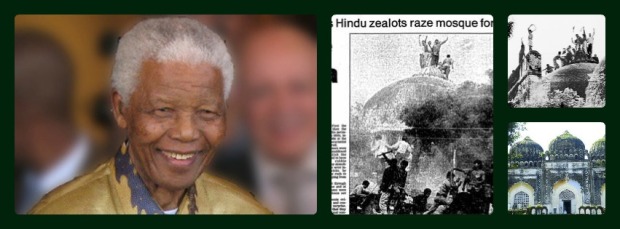My friend called me in the morning to tell me that Nelson Mandela had passed away.
The first time I read about him was in the history books at school. As a child, I was surprised that living men and women still made it to the history books. I always thought history was made up of dead men and women. I don’t remember much of him then. I guess I had other things to fill up my childhood world. As I grew up, I would read about him in the occasional newspaper article, the Wikipedia links and the website posts. Then of course, I watched films like Invictus. This was also the film that convinced many people that Morgan Freeman and Nelson Mandela are one and the same person. Yes, some people still believe that.
What I could never get over, was how a man spent long years inside a box-like cell, just biding his time. He waited, and then waited some more. When the time was right, he emerged, did what he was meant to do. Today, he is gone after having fulfilled his purpose.
I want to tell you that today is not just about Madiba though. It also marks the anniversary of an event that forever changed the political and religious landscape of India. It was a fight over a piece of land, being claimed by two Gods.
On the 6th of December 1992, a group of Hindu extremists destroyed a 16th century mosque in the city of Ayodhaya, a sacred city which is believed to be the birthplace of Lord Ram, one of India’s most prolific Hindu gods. It was incited by a political party who wanted to “reclaim the land in the name of Ram”.
The next few months witnessed a catastrophic fracture between the two communities. There were riots all over and over 2,000 Indians died as a result. Hindus and Muslims burnt people, homes, temples and mosques. It became an excuse for later acts of terrorism.
Many sources claim that the demolition was a planned political move, having been prepared as early as ten months in advance. I don’t think either god won that day.
India changed.
The “property dispute” came to an end in 2010, with the land being divided into three equal parts between the two communities and a third party. I was old enough to remember this day. I remember how tense the entire country was, in the days leading to the verdict. People stayed at home, there were special police patrols anticipating riots, and our collective breath was short and hurried.
Every year, the anniversary is marked with tension. Violence is expected, extra police are posted and so on. Newspapers publish statewide reports of how it passed. This anniversary was mostly peaceful, barring one incident of stone pelting in the city of Hyderabad and some isolated agitations here and there.
All we leave behind are legacies. Nelson Mandela leaves behind one of peace, struggle and love. And then we struggle with the story of the broken mosque in the name of God.
(Images: The Guardian & Wikipedia)

Nelson Mandela did so much for his country despite having spent so many years in prison. It just goes to show how much someone can achieve in such a short space of time. He will be missed by many but I hope there will be others who are willing to pick up the mantel and fight for equality for all.
Every person will leave behind a legacy of some sort. Some good and others bad.
I sure hope that there will be others to carry it on. He was one of the last greats.
I did not know that December 6th marked such a tragic event in India, so thank you for posting about this. I don’t recall learning about Nelson Mandela until I started to study human rights in college. It always bugged me in high school how the only history we focused on was European and American. That’s why I’m so interested in other cultures now. I could see the map. I know there are more than two continents out there.
Peace
Thank you for reading. :)
Even back at school, his name was just mentioned in a couple of places. Most of the other chapters, as you said were Eurocentric interpretations of history.